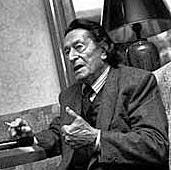Henri Laborit | |
|---|---|
 Laborit in 1991 | |
| Born | 21 November 1914 |
| Died | 18 May 1995 (aged 80) Paris, France |
| Nationality | French |
| Known for | Discovery of the effects of chlorpromazine, GHB, gamma-OH, clomethiazole, minaprine |
| Awards | Chevalier of the Legion of Honor, Lasker-DeBakey Clinical Medical Research Award, Nobel Peace Prize 1985 (as part of the Honour's Committee for the IPPNW) |
| Scientific career | |
| Fields | neurophysiology, pharmacology, psychiatry, psychosomatics |
| Institutions | Val-de-Grâce, Boucicault Hospital |
Henri Laborit (21 November 1914 – 18 May 1995) was a French surgeon, neurobiologist, writer and philosopher. In 1952, Laborit was instrumental in the development of the drug chlorpromazine, published his findings, and convinced three psychiatrists to test it on a patient, resulting in great success. Laborit was recognized for his work, but as a surgeon searching for an anesthetic, he came to be at odds with psychiatrists who made their own discoveries and competing claims.
Laborit wrote several books where he popularizes his ethological laboratory research and marries it, through systems thinking, with knowledge from several other disciplines, being a strong advocate of interdisciplinarity and transdisciplinarity. His writings can also be found to have deep roots in anarchist thought. He was personally untroubled by the requirements of science and the constraints of university life. He maintained an independence from academia and never sought to produce the orderly results that science requires of its adherents.[1][2]